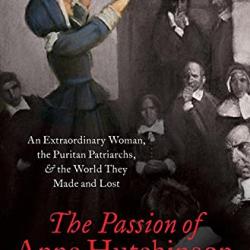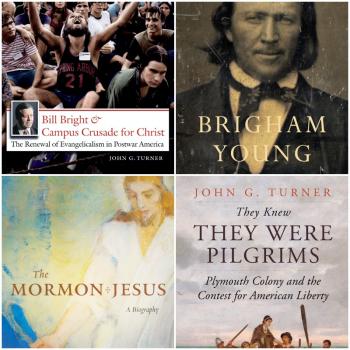One of my favorite things about spending several summers in Utah was enjoying an extra holiday on July 24th, commemorating the 1847 pioneer trek from the Missouri River to the Salt Lake Valley. For my family, Pioneer Day meant the Pioneer Day Classic road race in Provo, which loops around the Provo Temple (and, unlike many races, welcomes jogging strollers), various children’s activities at Provo’s North Park, and spending the rest of the day recovering from the race. Stifled by a lack of such events in northern Virginia, I am consoling myself with the gritty pioneer story outlined below:
Mormon pioneer women deserve their reputation for resilience, self-sacrifice, and sheer toughness. I always tell my classes about Louisa Beaman, a plural wife of Joseph Smith and Brigham Young who lost five children in infancy before dying of breast cancer not long after reaching Utah. In her honor, an early party of Latter-day Saints exploring southern Utah christened Fort Louisa, later renamed Parowan.
Another example is Vienna Jacques, born in 1787 and an early Massachusetts member of what was then simply called the Church of Christ. Shortly after her baptism, she headed west, stopping in Kirtland, Ohio (where Joseph lived) before heading for Zion in Jackson County. While in Kirtland, Joseph Smith directed her by revelation to consecrate her property to the church. The earliest extant copy of the revelation reads:
I say unto you it is my will that my hand maiden Viana should receive money to bear her expences and go up unto the Land of Zion and the residue of her money I will consecrate unto myself and reward her in mine own due time verely I say unto you <that> it is meet in mine eyes that she should go up un to the Land of Zion and receive an inheritance that she may settle down in peace <in as much as she is faithful> and not be Idle in her days from thenceforth
Jacques responded by leaving a considerable portion of her property in the church’s hands. A half year later, he wrote her a lengthy letter, which she received in Missouri. I recently read a copy of the letter on the Joseph Smith Papers website, a veritable treasure trove of research materials. By this time, Smith had received word of the persecutions endured by the Saints in Jackson County and their agreement to abandon their property by the end of the year. Smith expressed his gratitude and concern for her welfare:
I have often felt a whispering since I received your letter like this Joseph thou art indebted to thy God for the offering of thy Sister Viana which proved a savior of life as pertaining to thy pecunary concern therefor she should not be forgotten of thee for the Lord hath done this and thou shouldst remember her in all thy prayers and also by letter
The prophet suggested in the letter that the Missouri Mormons’ own transgressions were at least partly responsible for their calamities. Smith closed the letter “your unworthy brother in Christ.”
What initially caught my attention about the letter is the fact that the signature is cut off, with an explanatory note added in 1859: “This letter was sighned by Joseph Smith own hand. which autograph was cut off by Pres. B Young March 4th 1859.” Was this true? I checked the Historian’s Office Journal for that date and found the following entry: “Pres. Young sent over to the Historian Office after the autograph of Joseph Smith. which was furnished him from a letter that Joseph wrote himself & sent to Vienna Jaques.” The entry does not explain why Brigham Young wanted Joseph Smith’s autograph. I surmise that he didn’t have one and simply wanted a copy of his beloved Joseph’s signature.
I couldn’t help but become curious about the recipient of Joseph Smith’s letter, Vienna Jacques. She had given her wealth to the church in return for an inheritance in Zion, which she lost before the end of the year as the Mormons were forced to leave Jackson County. Eventually, she — never before married, I believe — wed the widower Daniel Shearer. They eventually moved to Nauvoo, Illinois, the gathering place for the Saints after the 1839 expulsion from Missouri.
At some point, that marriage apparently fell apart. “Vienna Sherer” and “Daniel Shearer” passed through the endowment ceremony in the Nauvoo Temple on separate days. In 1847, Vienna Jacques traveled to Utah, again by herself.
By the fall of 1848, now sixty years of age, she was living in miserable and despondent circumstances. Tired of living in her wagon, she penned a letter to Brigham Young:
You told me to hold on, respecting my Lot, but you did not say how long I must wait. Now if you think I am worthy to have a Lot or a part of a Lot if you will let me know where it lais [lays] so that I can have my adobies halld on to some place I will endever to build as neet a house as others do so as not to disgrace your City.
Jacques wanted a home near the planned temple at the heart of the city, so, in her words, “I can walk to the place of worship.” As if the above did not fully express her impatience and frustration, she added a postscript:
If I knew you would take time to read it I should like to tell you some things one thing is W W Phelps has troubled my heart, by telling me that there was no Lot for me any where within a great distance from where the Temple is to be, he has given me an offer (through his wife) to come into his family & he will build me a house but I cannot accept of the offer.
Jacques preferred to place her welfare with someone else, informing the church president that it was her “calculation to have put my oxen & waggon and all into your hands … & had you seen to my haveing a home but when I mentioned to Mary Ann your wife she seemed to repulse me by telling me you had so many on your hands.” Underscoring the frailty of her situation, she closed her letter with a final sign of her poverty: “My waggon cover is so rotted that I cant live under it an other winter.”
She evidently later was sealed by proxy to Joseph Smith for eternity. Some researchers have suggested that she was sealed to the first Mormon prophet toward the end of his lifetime, but clear evidence is lacking. Jacques lived without a husband during what turned into a surprisingly long life in Utah. Her erstwhile husband Daniel Shearer came to Utah in the 1850s, but the couple never reunited. She lived with a young family in Salt Lake City’s 12th Ward. Vienna Jacques died in 1884, nearly one hundred years of age.
The life of Vienna Jacques brings to mind many of the themes of early Latter-day Saint history: persecution, the intense uncertainty and upheaval within many families because of both expulsions and plural marriage, poverty, and perseverance. A sixty-year-old woman, separated from her husband, spending the 1847-1848 winter in the Salt Lake Valley by herself in her wagon, unafraid to write a sharp and sarcastic letter to Church President Brigham Young, and able to fend for herself when left to do so.
















